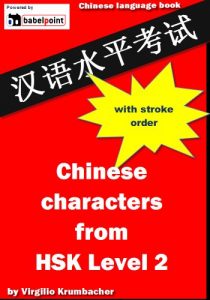This book contains the 163 Simplified Chinese Characters necessary to pass the HSK Level 2 test (Character range: 177 - 339). Each character is displayed in a large handwriting font and it has its pinyin readings and the most important English translations. The strokes are labeled in order by small numbers. The arrow following the number 1 shows you the writing direction.
Search for Chinese characters from HSK Level 1 ASIN: B005G2159C on the Kindle store to find the book for HSK Level 1 (Character range: 1 - 176).
About the HSK
The Hanyu Shuiping Kaoshi, abbreviated as HSK, is the People's Republic of China's only standardized test of Standard Chinese language proficiency for non-native speakers, namely foreign students, overseas Chinese, and members of ethnic minority groups in China. It translates literally to "Chinese Proficiency Test".
The China National Office for Teaching Chinese as a Foreign Language (Hanban) is currently responsible for the HSK exams and introduced a new format in November 2009. The new format's emphasis is "comprehensive language and communication ability". Most notable is the inclusion of spoken and written segments at all levels (not just Advanced), reformation of the ranking system, and use of new question structures.
The new ranking system reduces the three test formats to Elementary, Intermediate, and Advanced. Each level has two sub-levels: "acceptable" and "with honors."
Search for Chinese characters from HSK Level 1 ASIN: B005G2159C on the Kindle store to find the book for HSK Level 1 (Character range: 1 - 176).
About the HSK
The Hanyu Shuiping Kaoshi, abbreviated as HSK, is the People's Republic of China's only standardized test of Standard Chinese language proficiency for non-native speakers, namely foreign students, overseas Chinese, and members of ethnic minority groups in China. It translates literally to "Chinese Proficiency Test".
The China National Office for Teaching Chinese as a Foreign Language (Hanban) is currently responsible for the HSK exams and introduced a new format in November 2009. The new format's emphasis is "comprehensive language and communication ability". Most notable is the inclusion of spoken and written segments at all levels (not just Advanced), reformation of the ranking system, and use of new question structures.
The new ranking system reduces the three test formats to Elementary, Intermediate, and Advanced. Each level has two sub-levels: "acceptable" and "with honors."






